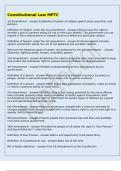Constitutional Law MPTC
1st Amendment - answer-Establishes freedom of religion,speech,press,assembly, and
petition.
Definition of religion under the 1st amendment - answer-Citizens have the right to
worship a god or supreme being (Or not to hold such beliefs). The government can not
require or force observations or compel citizens to follow any particular religion.
Definition of Speech under the 1st amendment - answer-Protected speech includes
spoken and written words, the act of not speaking and symbolic conduct.
What are the following types of speech not protected by the 1st amendment. - answer-
Obscenity, fighting words, threats, incendiary speech.
2nd Amendment - answer-Establishes the right to keep and bear arms. Intended to keep
and protect the individuals right to possess personal firearm for lawful purposes.
4th Amendment - answer-Prohibits unreasonable searches and seizures by the
government.
Definition of a Search - answer-Physical invasion or intrusion of privacy by police on
people, homes or personal property to obtain info or gather evidence.
Definition of a seizure - answer-When police take possession of property, make an arrest,
or restrict a persons ability to move freely.
5th Amendment - answer-Prohibits citizens from being punished for the same offense
twice (Double Jeopardy) from being compelled to testify against themselves (Self-
Incrimination) provides the right to indictment for certain types of offenses by a grand
jury and guarantees due process of law.
6th Amendment - answer-Requires all persons charged with a crime be informed of
charges against them. People charged with a crime have a right to council and right to a
speedy trial by impartial jury.
8th Amendment - answer-Protects people from excessive bail and fines and prohibits
cruel and unusual punishment.
14th Amendment - answer-Provided the people of all states the right to "Due Process"
and Equal Protection" under the law.
Definition of Due Process - answer-Notice and opportunity to be heard fairly.
Definition of Constitutional Law - answer-Basic law of the land
Bill of Rights definition - answer-First 10 amendments to the Constitution
, US constitution definition - answer-Supreme Law of the land 7 articles 27 amendments
Massachusetts constitution Definition - answer-The commonwealths document that
describes how state government is structured and articulates the rights of all residents.
Mass Constitution Article 12 (XII) Definition - answer-No Subject shall be held to answer
for any crimes or offense, until the same is fully and plainly, substantially and formally,
described to him; or be compelled to accuse, or furnish evidence against him. And no
subject shall be arrested, imprisoned, despoiled, or deprived of his property, immunities,
or privileges, put out of the protection of the law, exiled, or deprived of his life, liberty, or
estate , but by the judgement of his peers, or the law of the land.
Mass constitution Article 14 (XIV) - answer-Every subject has a right to be secure from all
unreasonable searches, and seizures, of his person, his house, his papers, and all his
possessions.
Statutory Law - answer-Written and enacted by legislative branches of state or federal
governments. Declare, command, or prohibit something.
Case Law - answer-Decisions by federal and mass courts, primarily the U.S. Supreme
Court, the SJC, and Mass appeals court.
Objective - answer-"Others" - What a reasonable person would do, act, or believe
Subjective - answer-"Self" - What an individual person did or believed
Reasonable Suspicion - answer-Must be based on specific and articulable facts which,
when taken together, would convince a person of reasonable caution to believe that a
person has committed, is committing, or is about to commit a crime.
Probable Cause - answer-Trustworthy facts and circumstances sufficient to convince a
person of reasonable caution to believe that it is more likely than not.
Probable Cause - in the case of a search. - answer-A specific item subject to seizure will
be found in the place to be searched.
Probable Cause - in the case of an arrest - answer-A crime has been committed and the
person to be arrested has committed it.
Collective Knowledge - answer-Knowledge of one is the knowledge of all. Information
held by one may be used to establish reasonable suspicion or probable cause even if not
witnessed firsthand by or communicated to the officer making the stop, search, or arrest.
Veracity - answer-Whether the source is reliable or believable
Basis of Knowledge - answer-Is how the source or witness acquired the information




